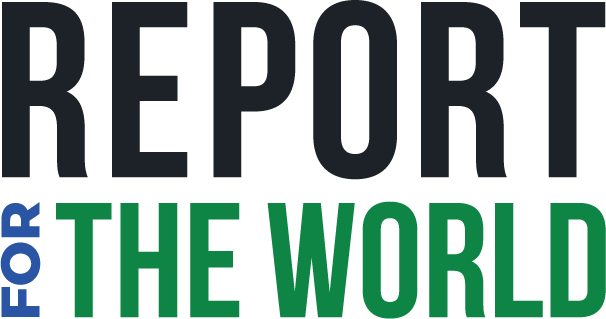“Local news media is the most disrupted sector of the media, the most urgently in need of assistance — and the sector with the greatest potential to form the bedrock for a new, stronger media ecosystem,” said Jacqui Park, head of network strategy and innovation at the International Press Institute (IPI) at the start of the panel, referencing a report from IPI about reviving local news globally.
So it’s no surprise that the panel tilted, “Strategies: Think Globally, Report Locally,” at this year’s World Congress from IPI, the global network of journalists, editors and publishers, included two of our corps members: Hibah Ansari is a second year Report for America corps member who covers immigration policy with Sahan Journal in Minneapolis, Minnesota. Vivian Chime called in from Lagos, Nigeria where she covers climate change for TheCable as one of our first ever Report for the World corps members.
They were joined by the Dean of Columbia Graduate School Steve Coll and our founder, GroundTruth CEO and Editor Charles Sennott moderated the discussion.
And with a stronger local media ecosystem comes more local reporting on the crisis within the other essential local ecosystems. But there is often a disconnect between the global reality of climate change and changes in the local environment.
In thinking globally, reporting locally, Chime noted that she often reminds people that climate change is not only affecting Nigeria – It’s happening in Benin, in Vietnam and in Ghana, too. And, it has exacerbated some socio-economic tensions. But she has found that the global crisis is best understood in Nigeria when its impacts on facets of local, daily life are reported. For example, she recently reported on the connections between increased flooding and an increased ability for diseases to spread in Nigeria.
“There is no better time to start telling local stories than now, especially at a time when many global issues are playing out locally,” said Chime.
But globally, the local news industry has been devastated by the disruptive innovations like the rise of the internet, to which the media industry was slow to adapt, explained Columbia Journalism School Dean and New Yorker Staff Writer Steve Coll.
Around the world, “you’ll see different pictures in different places,” but the patterns are generally the same. “To develop a vibrant sustainable, democratic, independent local news, we have to pursue lots of different models at the same time for the foreseeable future, like you’re doing at [GroundTruth].”
One of the models GroundTruth has pursued is Report for America, which, like Report for the World, places journalists in partner newsrooms to fill gaps in coverage.
For example, corps member Hibah Ansari’s reporting focuses on the needs, struggles, successes and stories of immigrant communities, and in her newsroom, she feels that “we are documenting the changing demographics of the state, which is pretty representative of our nation.” The stakes could not have been higher for this work: Ansari moved to Minneapolis to start her job the week after George Floyd’s murder by former police officer Derek Chauvin.
“I never felt a more important urgency to be a local reporter than I did at the start of my job at Sahan Journal,” Ansari said, adding that she felt fortunate Sahan Journal is so reputable and respected: “sources immediately trust me, which is really valuable.”
Covering a beat as diverse as Minnesota’s immigrant communities is not without its challenges, however. Ansari said she often finds herself faced with a language barrier to overcome, explaining that she’ll often ask if a source has a relative, friend or neighbor who can interpret during an interview. Not only are they then able to more easily communicate, but the interviewee has someone they trust on the call. While this process of interpretation can lengthen her interviews, it definitely helps make the conversation more candid.
In his final remarks, Coll called for the industry to rethink how local newsrooms attempt to persuade young journalists to join their staff, both across the country and around the world.
“We need your help in thinking about how we communicate the importance of local news,” he said. “It’s public service, not a charity. And it’s a great way to become a journalist.”

